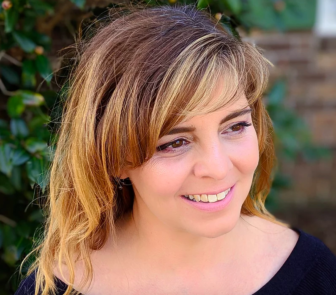Editor’s note: This story includes a reference to sexual assault and offensive activities by hate groups.
“I took all of this unprocessed trauma and completely pushed it down,” said Foley Martinez, who now helps others leave far-right hate groups. “I felt so worthless. I was just like, who’s worse than the Nazis? They’ve gotta take me in.”
For five years, Foley Martinez immersed herself in the world of the neo-Nazi skinheads. Everything she read and listened to revolved around white power. She attended Klan rallies, posted racist flyers around neighborhoods and associated exclusively with other white supremacists.
Eventually, she moved in with her boyfriend’s mother and became part of their family, playing frisbee in the backyard and going on camping trips. It was a turning point. “I was accepted by this family in a way that I didn’t have to espouse an ideology to belong,” she said. Slowly, her ties to the group fell away.

(Courtesy of Shannon Foley Martinez)
Now, more than two decades later, Foley Martinez helps other people break away from violent ideologies. She’s worked for schools, nonprofits and community organizations and has helped “scores” of people, including some in Western Pennsylvania.
The Capitol riot put white supremacist hate groups back in the national spotlight. But Pittsburgh has long been a hotbed for extremists: In 2018, 11 lives were taken in a shooting at the Tree of Life synagogue in the deadliest attack on the Jewish community in the United States. In November, the FBI called Pittsburgh a “hub” for white supremacy. And according to the Southern Poverty Law Center, many hate groups, including white supremacist groups, are active in the region and other parts of Pennsylvania.
We spoke to Foley Martinez and two Pittsburgh-based experts on extremist groups about the warning signs of radicalization, who’s most susceptible and what to do if you suspect a friend or family member is engaged in white supremacy.
(Photo via Adobe Stock)
READ ENTIRE ARTICLE AT:
What to do if your loved one is a white supremacist or in danger of radicalization